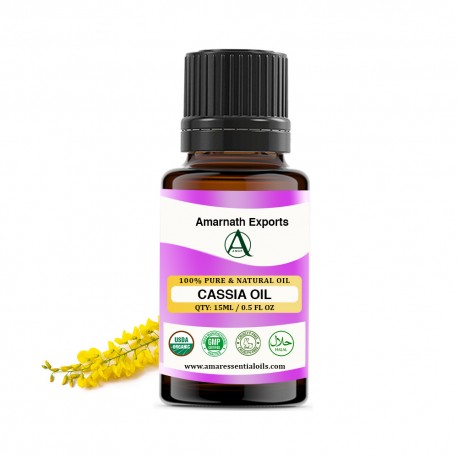Product successfully added to your shopping cart
There are 2 items in your cart. There is 1 item in your cart.
More info
- Botanical Name: Cinnamomum cassia
- Family Name: Lauraceae
- Common Name: Chinese cinnamon
- Part used: Bark
- Color and Appearance - Pale yellow mobile liquid
- Odor - Sweet Spicy Sightly Woody Balsamic
- Odour Strength - medium
- Grade - Cosmetic
- Country of Origin - India
- Main ingredients - Cinnamic Aldehyde, Methyl Eugenol, Salicylaldehyde
- Blends Well With: Benzoin, Frankincense, Ginger, Lavender, Rosemary, Coriander.
Buy Cassia Oil | Cinnamomum cassia
Cassia Oil traces its roots back to ancient China, where it was revered for its medicinal properties and aromatic qualities. The bark of the Cinnamomum cassia tree, native to regions of East Asia, was meticulously harvested and processed to extract the precious oil within. In traditional Chinese medicine, Cassia Oil was prized for its ability to invigorate the body, soothe digestive ailments, and promote overall well-being.
Cassia stands out as a primary spice in culinary practices and belongs to the Fabaceae family. The essential oil of Cassia is acquired through steam distillation of the bark of Cinnamomum cassia. Contrary to cinnamon bark, Cassia's bark is thicker and darker, boasting flavors that lean toward the pungent side rather than sweet. Cassia Oil presents as a dark brown, free-flowing liquid, exuding a potent, spicy, and warm resinous aroma. Rich in cinnamic aldehyde, Eugenol, and various terpenoids, Cassia oil finds extensive use in beverages, pharmaceuticals, and oral care products.
Cassia Oil History
Modern scientific research has shed new light on the therapeutic potential of Cassia Oil. Comprised of compounds such as cinnamic aldehyde, eugenol, and cinnamyl acetate, this essential oil possesses antimicrobial, anti-inflammatory, and antioxidant properties. Studies have shown that Cassia Oil may help regulate blood sugar levels, support cardiovascular health, and even exhibit anticancer effects.
In a world inundated with synthetic remedies and pharmaceutical interventions, Cassia Oil stands as a beacon of natural healing and holistic wellness. From ancient civilizations to modern laboratories, its remarkable properties continue to inspire awe and fascination. Whether you seek relief from digestive discomfort, immune support, or emotional balance, Cassia Oil offers a natural solution rooted in centuries of tradition and scientific inquiry.
Uses and Benefits
Cassia oil enhances blood circulation, promoting the efficient distribution of nutrients and oxygen throughout the body. This attribute proves particularly advantageous in combating arthritis, muscle cramps, spasms, and rheumatism.
With its high refractive power, pure cassia oil is renowned for its potency.
In laboratory settings, cassia oil has shown activity against herpes and adenovirus.
The oil is utilized in the treatment of various digestive complaints, including diarrhea, colic, dyspepsia, nausea, and flatulence.
Among its many properties are antibacterial, antifungal, antiviral, antioxidant, anti-inflammatory, and anticoagulant qualities.
Cassia oil effectively combats depression, uplifting mood and inducing warmth.
Its antimicrobial characteristics aid in treating infections of the kidneys, colon, urethra, and urinary tract.
As a potent stimulant, cassia oil boosts metabolism, enhances bodily functions, improves secretions, circulation, discharges, and overall nervous system function.
Additionally, it exhibits potent effects against ringworm, inflammation, viral infections such as colds, flu, Candida, cataracts, arteriosclerosis, and atherosclerosis.
Its astringent properties strengthen hair roots, gums, skin, and muscles.
Cassia oil also assists in halting uterine and other external and internal hemorrhages by contracting blood vessels.
The oil possesses emetic, carminative, febrifuge, and emmenagogue properties.
Regarding diabetes, cassia oil is effective in lowering high blood sugar levels and aiding in the treatment of Type 2 diabetes patients with improper insulin functioning.
In other applications, the essential oil of cassia is used to flavor curries, soft drinks, candies, and baked goods. It serves as an economical alternative for fragrance applications.
Inhalation of this oil is said to have a spiritual and emotional influence on the mind.
Reviews
No customer comments for the moment.









